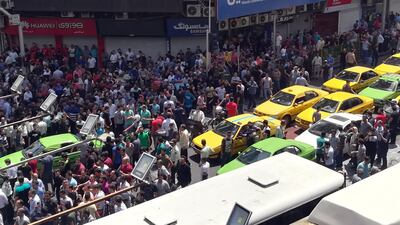Iran's Supreme Leader has demanded the judiciary punish those "who disrupt economic security" on Wednesday, following protests over the rial's collapse and a tightening of U.S. sanctions pressure that has set the arch-foes further on a course of confrontation.
"The atmosphere for the work, life and livelihood of the people must be secure," Ayatollah Ali Khamenei said in a meeting with judiciary officials, according to his website.
His comments follow those of hardline judiciary chief Ayatollah Sadegh Larijani, who threatened “economic saboteurs” with execution on Tuesday.
Strikes against rising prices and a collapsing rial began with electronics vendors in Tehran on Sunday and spread to the capital's Grand Bazaar on Monday. Anti-government protests then followed in centres across the country.
The last major demonstrations at the start of the year spread to 80 provincial towns and cities and eventually resulted in the deaths of more than 20 protesters. Facing potential escalations again, Iranian officials have threatened a crackdown.
“These actions against [Iran’s] economic order are punishable by execution — if found to be on the level of ‘corruption on earth’ — or up to 20 years in prison and the confiscation of all possessions,” Ayatollah Larijani said in a speech to judicial officials in Tehran.
The chief justice added: “We will not hesitate to implement the law.”
Iranian officials have blamed the protests and the country’s economic state on a plot by the United States. “The enemy is now trying to disrupt our economy through a psychological operation,” Ayatollah Larijani said.
'Resistance economy'
The administration of US President Donald Trump has pursued an aggressive new sanctions regime against Iran since withdrawing from the nuclear deal last month.
The administration is warning its allies against buying Iranian oil by the time new sanctions take effect on November 4. Foreign banks and businesses will face the risk of being blocked from the global dollar based financial system if they continue dealing with Iran.
The prospect of renewed sanctions is hurting business confidence and causing the value of the rial to plummet to record lows. The official rate 42,500 is rials to the dollar but the black market rate has dropped as low as 90,000 this week. On Wednesday, the rial rallied somewhat to 78,500.
__________
Read more:
Behind Iran protests, analysts see hardliner effort to oust Rouhani
Re-imposition of US sanctions will dent Iran’s consumer sector
Iran’s economy to deteriorate following the re-imposition of US sanctions, BMI says
__________
But renewed sanctions will not necessarily force Iranian authorities to bow to US pressure. In March, the International Monetary Fund estimated Iran had $112 billion (Dh411.3bn) of foreign reserves and assets and a current account surplus, suggesting its economy may be able to withstand sanctions.
“Even in the worst case, I promise that the basic needs of Iranians will be provided. We have enough sugar, wheat, and cooking oil. We have enough foreign currency to inject into the market,” President Hassan Rouhani said in a live broadcast on state television on Tuesday.
In an attempt to try and control rising prices and resist US sanctions, the government has banned imports of 1,339 products ranging from footwear to furniture, which the government believes could be produced domestically. It appears to be a return to the Iran's “resistance economy” of self-sufficiency in the face of foreign pressure which had eased as sanctions were lifted last January as part of the nuclear deal.
But financial woes are not the only grievances voiced by protesters, who have chanted “death to the dictator” and “Leave Syria and think about us”, in reference to Iran’s Islamic Revolutionary Guards Corps’ support of Syrian President Bashar Al Assad in the country’s civil war. “Slogans have targeted both sides,” — meaning both reformists and hardliners in Iran’s government, said Middle East analyst Raman Ghavami. “The reality on the ground is that Iranians view both factions as one body.”

